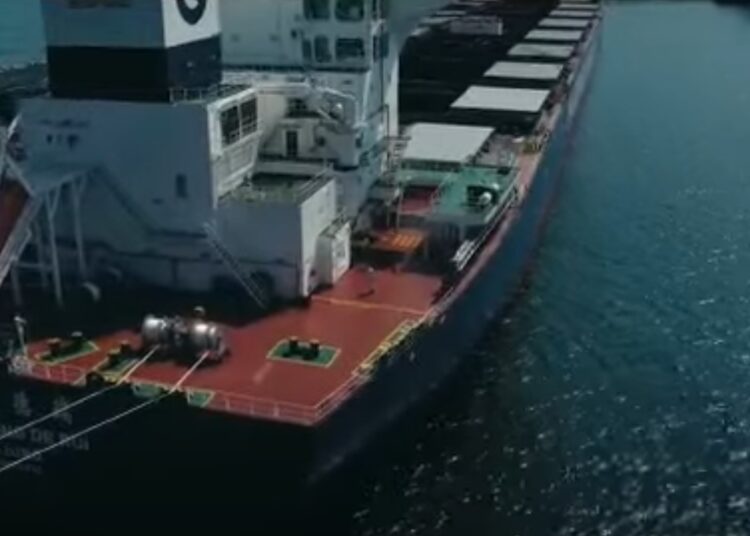Abdullah Bozkurt/Stockholm
The “torpedo method” of drug smuggling from Colombia has surfaced in Turkey, a country that has increasingly become both a hub and a destination for major cocaine trafficking under the permissive and facilitative environment deliberately fostered by the corrupt regime of Turkish President Recep Tayyip Erdogan. A rare court case in which drug convictions were overturned by the nation’s top court has publicly revealed the depth of systemic negligence and deliberate inaction in Ankara’s narcotics investigations.
Turkey’s highest criminal court has overturned 30-year prison sentences handed down to the captain and first officer of a Panama-flagged cargo ship accused of importing 31 kilograms of cocaine from Colombia, exposing serious failures and negligence in how the country handles narcotics cases.
In a ruling dated January 15, 2025, the Supreme Court of Appeals General Criminal Assembly (Yargıtay Ceza Genel Kurulu) found that prosecutors had failed to prove the crew’s involvement in the sophisticated smuggling operation. The decision suspended the sentences, ordered the defendants’ release and once again emphasized how Turkey’s judiciary routinely delivers politically convenient convictions instead of judgments based on evidence and the law.
The case drew renewed attention to the so-called “torpedo method,” a maritime smuggling technique long used by Colombian cartels. In this method metal capsules filled with cocaine are magnetically attached to a ship’s hull below the waterline, allowing traffickers to use unsuspecting or complicit merchant vessels as transporters. Divers later retrieve the packages near their destination using specialized underwater equipment.
The appearance of this technique in Turkey, never previously documented in public records, highlights the country’s growing role as an important entry and transit point for Latin American cocaine shipments destined for Europe, the Balkans and the Middle East.
According to court documents, the case began with intelligence received by Turkey’s Security Directorate General (Emniyet) on August 22, 2020, warning that a Colombian vessel arriving at the port of Zonguldak would be carrying cocaine. The Panama-registered bulk carrier had departed Drummond Port in Colombia on August 1, 2020, with more than 165,000 tons of coal destined for a Turkish power plant.
The ship, manned by a 20-member Chinese crew and owned by Shandong Shipping Corporation (SDSC), crossed the Atlantic, passed through the Dardanelles and the Istanbul Straits and on August 20, 2020, reached the destination port, where it anchored off Zonguldak. Turkish shipping company Metro Gemi Acentalığı Nakil ve Ticaret A.Ş. served as the local agent and provided a mobile phone to the captain for logistical communication.
Police surveillance began the following day. When the ship docked on August 23, 2020, officers boarded with a translator and a narcotics detection dog. The initial search of the decks, cabins, engine room and cargo holds revealed nothing suspicious. Only after divers from a private Zonguldak diving center examined the underwater hull did they discover a hydrodynamically designed metal container attached with 14 powerful magnets to the port side near the 15 to 16 meter draft marks, in a location that was invisible from the deck.
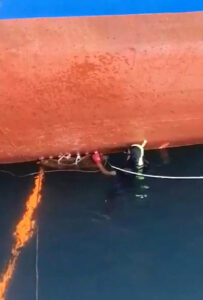
The capsule measured 83 by 53 by 16 centimeters, was sealed with waterproof plastic and screws and had a slanted nose to minimize drag. Inside were 28 packages of cocaine weighing a total of 27.89 kilograms.
The Zonguldak 3rd High Criminal Court convicted Captain Guangjian Xu and First Officer Kaibo Wu, sentencing each to 30 years in prison, and imposed a 200,000 lira fine. Chief Engineer Junjie Zhang was acquitted. The court reasoned that as senior officers they bore responsibility for the vessel and must therefore have been aware of the drugs. Remarkably, though all three were initially indicted, the trial prosecutor ultimately recommended acquittal for all of them at the final hearing.
Meanwhile, the ship was allowed to depart on August 30, 2020.
Forensic fingerprint analysis of 287 latent prints found on the packaging and latex coverings yielded no matches with any crew members.
Nevertheless, appellate courts in Sakarya and the 10th Criminal Chamber of the Supreme Court of Appeals upheld the verdicts in 2021, citing the principle of chain of command responsibility. However, the General Criminal Assembly in 2025 determined that this reasoning was fundamentally flawed, overturned the convictions and acquitted the suspects.
Inspection reports from Drummond Port showed that Colombian authorities had carried out a standard underwater hull survey on July 31, 2020, using navy-certified divers. Their report concluded that the hull, rudders and propellers displayed no irregularities, suggesting that traffickers attached the cocaine capsule shortly after the inspection. Such an operation could be completed in under two minutes by two divers using closed-circuit breathing systems.
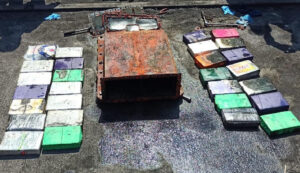
Internal correspondence between the shipowner’s insurer and its Colombian agent, submitted in court, confirmed that torpedo-style smuggling was a known threat at Drummond Port. Colombian narcotics units had warned insurers that drug syndicates frequently used magnetic containers or torpedoes attached by cooperating dockworkers or divers, often without the crew’s knowledge. Turkish judges accepted this as the most probable explanation.
The case also exposed the lack of genuine investigative effort by Turkish authorities. Despite explicit instructions from the chief public prosecutor to examine HTS (call record) data from phones belonging to both the crew and the Turkish maritime company communicating with the vessel, the police failed to analyze the records.
Turkish authorities also did not bother cooperating with Columbia on the evidence and did not seek any judicial or law enforcement cooperation. Even more striking, investigators never determined who was meant to receive the drugs in Turkey nor did they pursue leads on potential local facilitators or dockside handlers.
The court found it particularly troubling that intelligence from the Narcotics Bureau had specifically predicted a transfer operation at Zonguldak, possibly using small boats, yet no surveillance or interception efforts were directed at the coastline or nearby vessels.
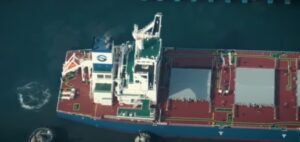
In effect, law enforcement limited the entire investigation to the foreign crew, closing the case quickly while any potential Turkish links vanished from scrutiny.
The ruling also cited a related case heard by the Çanakkale 1st High Criminal Court on November 24, 2021, involving another ship that had departed Drummond Port in July 2020. There, too, authorities discovered a magnetically attached capsule containing cocaine on the hull.
The parallels — identical port of origin, same smuggling method and nearly identical timeline — indicated a broader pattern of cocaine of Colombian origin routed through Turkish ports using the torpedo method. Yet, as in Zonguldak, no Turkish intermediaries or receiving networks were identified, exposing the authorities’ systemic unwillingness to pursue domestic angles of international trafficking operations.
The case sheds light on a deeper issue: Turkey’s transformation into a cocaine transit hub under Erdogan’s watch. In recent years cocaine seizures at Turkish ports such as Mersin, Izmir, Zonguldak and Iskenderun have surged, coinciding with the rise of Erdogan-aligned business elites and state-linked shipping companies that operate opaque networks across Latin America, West Africa and the Balkans.
Critics and former law enforcement officials argue that the government has cultivated a facilitative environment for transnational trafficking by shielding politically connected operators, manipulating statistics and obstructing serious financial and intelligence probes.
The Erdogan government, run jointly by his Islamist party and its far-right ally, the Nationalist Movement Party (MHP), has directly benefited from the expanding drug trade, enriching itself through kickbacks from trafficking profits in exchange for protection from investigation. Police chiefs, prosecutors and judges who once pursued such cases were dismissed, and some were imprisoned under fabricated coup-related charges.
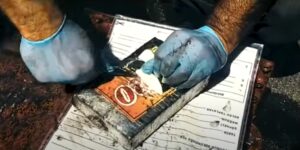
from one of the dozens of plastic-wrapped bags that were extracted from a metal container attached to the hull of a Chinese freighter that was transporting coal, according to its manifest.
Against this backdrop, the Zonguldak case stands out as an anomaly, a rare moment when judicial reasoning briefly prevailed over political expedience, albeit confined to foreign defendants. Even these convictions, however, were ultimately overturned by the Supreme Court of Appeals, dominated by Islamist and nationalist judges whose overriding mission remains shielding government officials and their cronies from accountability.
The General Criminal Assembly’s ruling annulled all prior judgments, suspended the sentences, ordered the defendants’ release and remanded the case to the Zonguldak 3rd High Criminal Court for retrial in line with the acquittal reasoning.
While the acquittal represents a procedural victory, it simultaneously exposes the emptiness of Turkey’s much-publicized anti-drug campaign. Authorities routinely boast of seizures measured in kilograms or tons, yet seldom dismantle the financial or logistical infrastructure behind them. In this case no Turkish participant was ever identified, no controlled delivery was attempted and no follow-up arrests were made. Only foreign sailors were imprisoned for several years to maintain the illusion of state action.
The “torpedo” case starkly illustrates how Erdogan’s corrupt and authoritarian system has hollowed out the rule of law, transforming criminal justice into a propaganda tool. It also reveals how Turkey’s ports, long neglected, politically captured and poorly supervised, have become vital entry points in the global cocaine trade connecting Latin America to Europe.
By freeing the convicted sailors and avoiding any probe into local accomplices, Turkish authorities have once again confirmed that the real power behind the cocaine trade lies not beneath the hulls of ships but within the corrupt corridors of Ankara, where officials and their cronies enrich themselves at the expense of addicts and justice alike.

